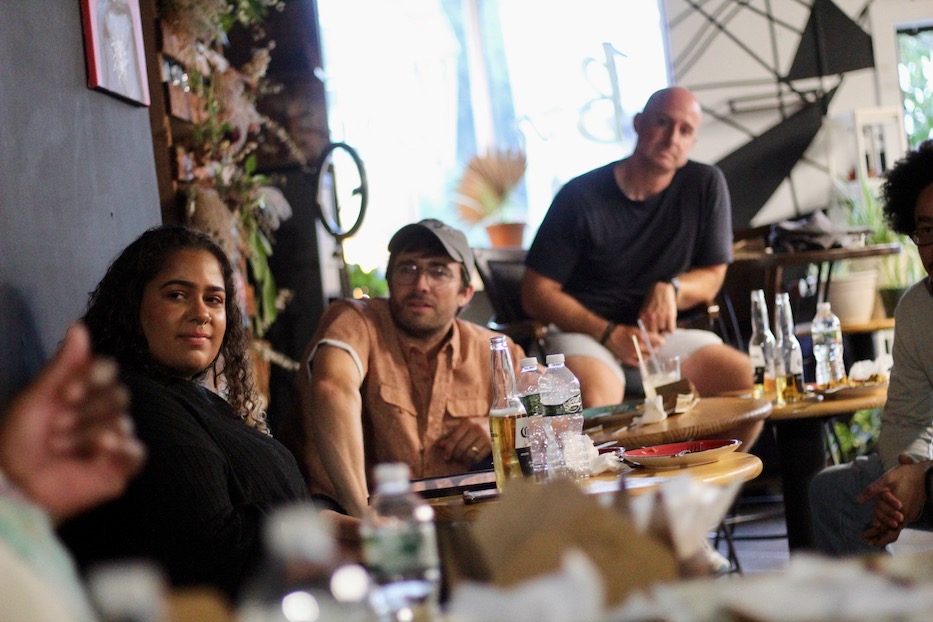
Culture & Community | Arts & Culture | The Hill | Arts & Anti-racism | Education | Oddfellows Playhouse Youth Theater | Arts For Learning CT
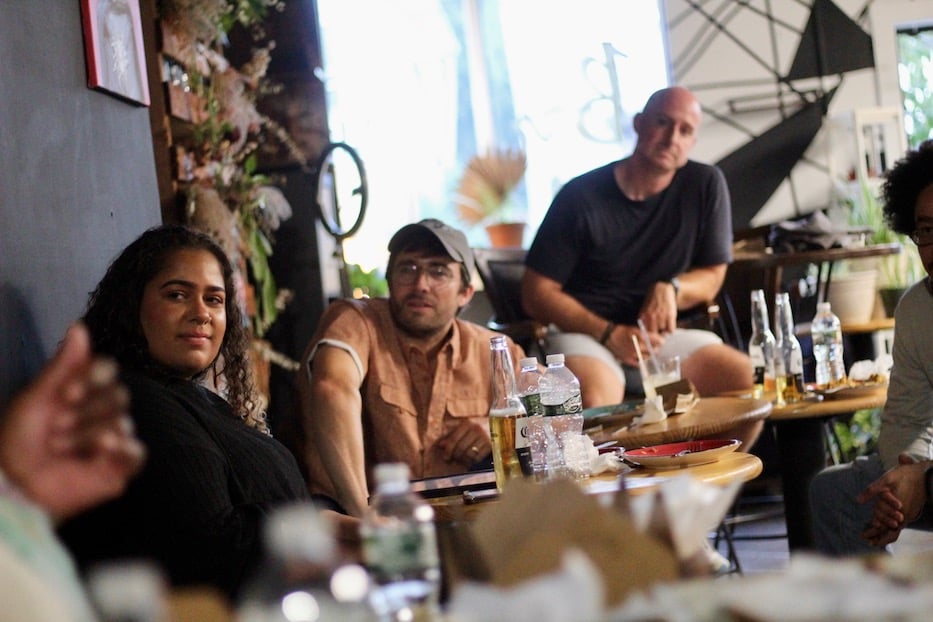
Stewart at Tuesday's dinner. She had high praise for the program, which will begin its second cycle in October. Lucy Gellman Photos.
The first time artist Anika Stewart stepped into a classroom to teach, she realized there was a whole social and emotional toolkit she had never learned—and that she desperately needed to get through a summer with middle schoolers. Then she got the chance to work with poet and teaching artist Shanna Melton. Six months later, she feels more prepared to design a curriculum and respond to students' needs in real time than she ever has before.
That's the idea behind "Emerge," a new training program from Arts for Learning Connecticut (AFLCT) and The Teaching Artist Hub that pairs aspiring teaching artists with mentors already in the field. Tuesday evening, the two organizations graduated their first cohort of mentees over rice, plantains, roasted veggies and empanadas at Madeline's Empanaderia, in a laughter-studded celebration that felt like it could have gone all night.
Pairs include Bennie Pharr IV and mentor Rob Santos, Anika Stewart and mentor Shanna Melton, Katiana Jarbath Smith and mentor Aisha Nailah, Maeve Cunningham and mentor Anthony DePoto, and Nomblé Tanner and mentor Kim Van Aelst. After graduating, all five mentees are now part of AFLCT's roster, from which it pulls and commissions teaching artists for projects during the year.
In its first year, the program was funded by a New Haven Cultural Vitality Grant, AFLCT and Oddfellows Playhouse in Middletown. It will open applications for a second year in September.
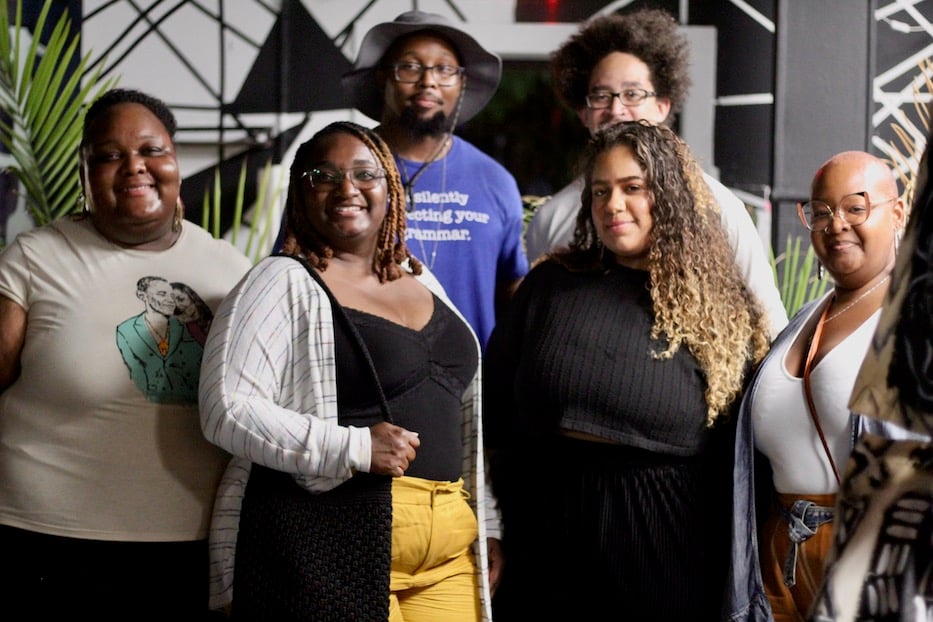
Members of the cohort who were there Tuesday included Pharr and Santos (in the back) as well as Melton, Smith, Stewart, and Nailah.
"There were no open doors that we could find, so if we didn't have that, we wanted to create it," said Lanea Collins, creative director of the Teaching Artist Hub. "It's so often who you know and the experience that you have. This came out of the desire to create a path."
The program has been over a year in the making. Last year, AFLCT Education Manager Alex Novak Foster was in the midst of interviewing teaching artist candidates when she started seeing a trend: lots of artists wanted to teach, but didn't specifically have the skills to step confidently into the classroom. There also wasn't a dedicated place for them to learn it—particularly if they came from a background outside of education.
That meant that hundreds of would-be teaching artists had no way to learn their craft. Something clicked in Novak Foster's mind. AFLCT already had access to teaching artists. The Hub, meanwhile, could connect the organization with the people who so badly wanted to learn. She and Collins realized that if they worked together, the program could take flight. Novak Foster also noted that the two wanted to make the state's boundaries, which often leave artists in municipal silos, seem more porous.
"We were mentoring each other in our mentorship," Collins said with a gentle smile, waiting to bite into a sweet potato empanada until she had finished her thought.
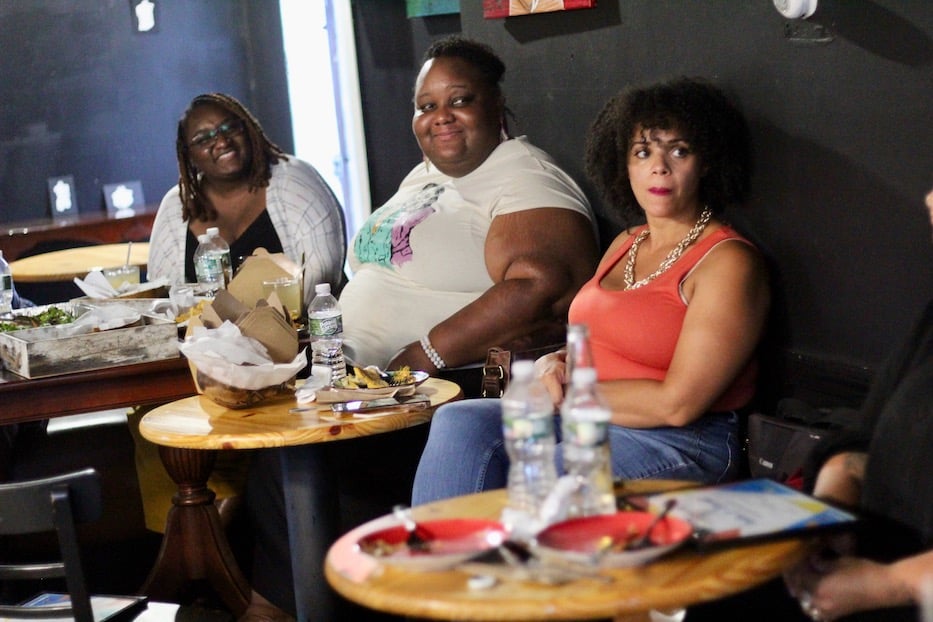
Katiana Jarbath Smith, Shanna Melton and Lanea Collins.
Tuesday, both mentors and mentees praised the program, offering feedback between bites of sweet, fried plantain, cheeseburger and curried potato empanadas, grilled veggies and fresh-squeezed lemonade. Stewart, who worked closely with Melton, recalled entering the program unsure of what to expect, and coming out feeling like she was ready to take on a classroom as a teaching artist still growing into herself.
For her, it came as a joy and a relief. The year before, she had joined the Justice Education Center to teach at a summer arts camp at James Hillhouse High School. Students, who hailed from around greater New Haven, were in middle and high school. While she enjoyed teaching, she sometimes felt like she didn't know what she was doing.
"Morally, I did not have the toolbox to teach those kids," she said. "I felt like I had done them a disservice."
Then she learned about Emerge, which was still in its nascent stages. In its first year, the program offered remote and in-person professional development, time observing an artist-mentor in the field, the creation and implementation of lesson plans and multiple "debrief meetings" with multiple program facilitators. Stewart was in.
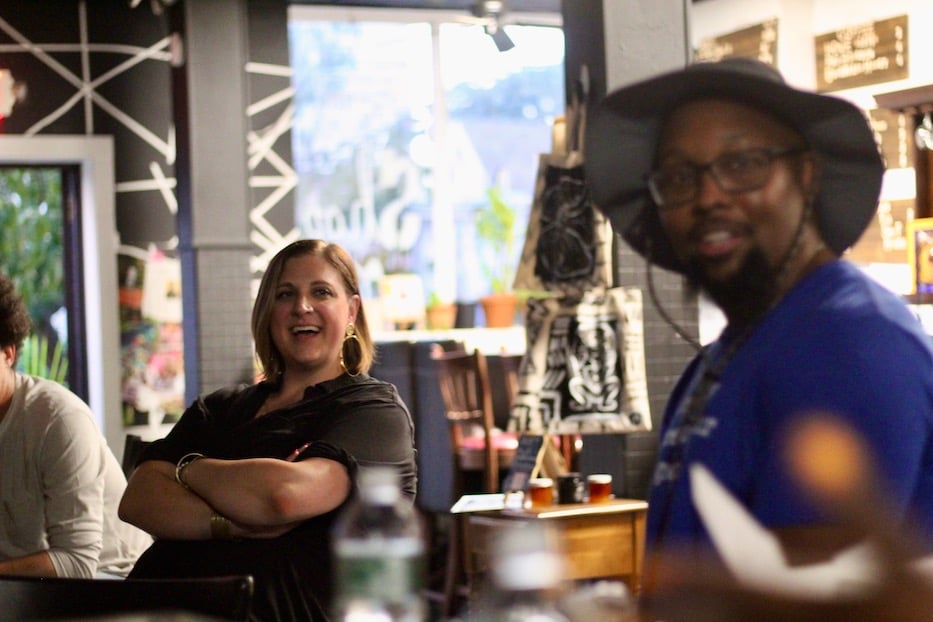
Alex Novak Foster.
"I learned all mentorship through Shanna," she said Tuesday, as a bowl of steaming tostones appeared magically on each table. Over six months, Stewart had the chance to watch Melton teach at Housatonic Community College and facilitate her long-running poetry and writing workshops. As she watched and listened, Stewart said, she learned how to build a curriculum that was socially and emotionally responsive and culturally competent.
Now, she thinks of herself as a teaching artist. When the Justice Education Center tapped her for a second year of teaching, she felt ready—and even excited—to get back into the classroom. This month, she finished her second year with the camp feeling self-confident.
The program, it seems, has been just as rewarding for mentors. Melton, who worked for years in Bridgeport as a classroom educator before she was a teaching artist, said she was grateful for the chance to teach a fellow artist about the art of teaching. After working for both the Bridgeport Board of Education and Housatonic, it gave her a different opportunity to stretch her skill set. "I loved it," she said.
“She wasn't hard to nurture," she added of Stewart with a gentle smile. "She came in with a gift, and I was glad to nurture it."
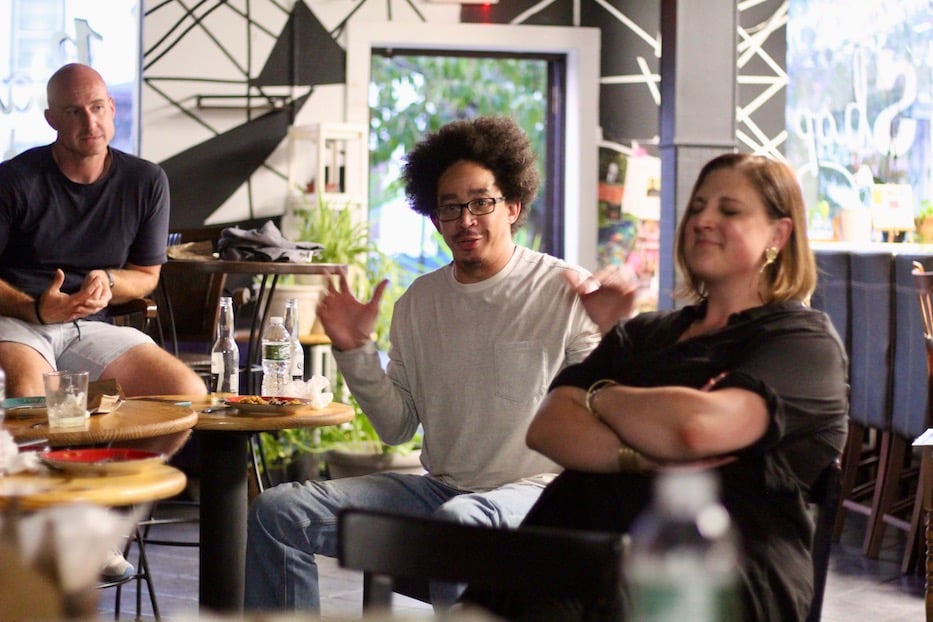
Santos, who got emotional at one point.
Pharr, who is a creative writer and recording artist, also praised Emerge for giving him the skills to confidently step into the classroom. For years, he's wanted to teach youth, but been unsure how to get a foot in the door, design a lesson plan, or run a workshop with a predetermined structure in mind. Then he applied for Emerge.
"The interest was always there, I just didn't know what that would look like," he said. His day job is in homelessness outreach, meaning that the art of his craft can sometimes feel far away, even for him. "How do you teach something that hasn't been taught to you?"
When he was paired with Santos, he was initially confused. Santos, he explained, is "outgoing," bubbly and expressive (Tuesday, it seemed that every sentence he spoke came with choreography, as if the night were an epic slam poem). He wasn't. Then he realized that facilitators knew exactly what they were doing: Santos helped "bring my personality out and bring it into the classroom."
Over the summer, Pharr worked with Santos at Horizons, a six-week summer program for eighth graders at Sacred Heart University. For weeks, he watched Santos teach 18 students, carefully studying his approach until he felt ready to take over a class.
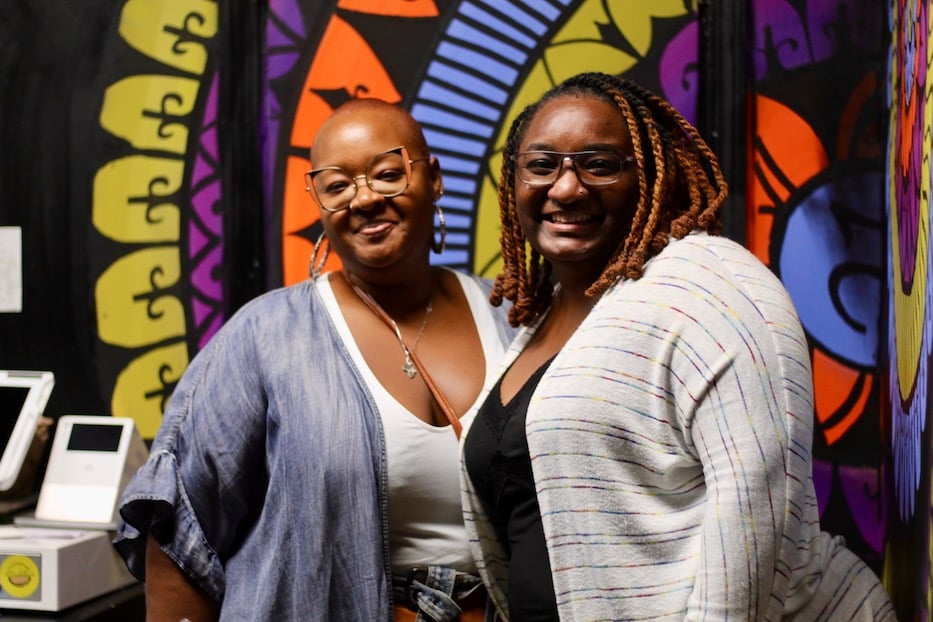
Santos, who got verklempt at multiple points throughout the night, said that one of his proudest moments was watching Pharr insist that he wasn't ready to teach, and then step forward and completely captivate a classroom with what he'd learned. He was able to hone those skills, Pharr said, while teaching a workshop with Sharmont "Influence" Little.
That's good news for the program, which will be returning with a second cohort after applications open this fall. Tuesday, AFLCT Executive Director John-Michael Parker announced to cheers and applause that it has received funding for at least one more cycle.
Novak Foster said that support comes from AFLCT, Young Audiences Arts for Learning Affiliate Development Fund, the City of New Haven Creative Arts Advancement Program and the International Association of New Haven.
Before the end of the night, Collins and Novak Foster both rose with framed certificates for each of the mentees. Trying not to get emotional, Collins recalled an early meeting where "everyone"—mentors and mentees alike—communicated that they had some fear of failure. "Are you still feeling that way now?" she asked.
"For me, I have a better understanding of what I'm walking into," Pharr answered.
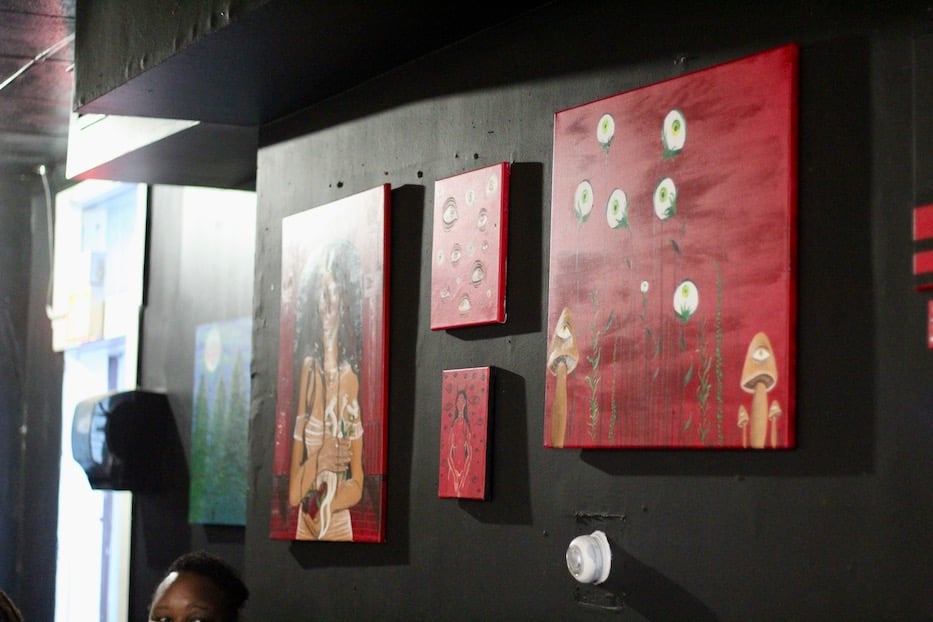
Anika Stewart's paintings in the space.
"I feel like when I move around youth now, I'm more comfortable in my skin," added Smith, who moments before had noted how Nailiah had taught her to work with a lesson plan and get out of her head when teaching visual art. "We're allowed to pivot and adjust and adapt."
Stewart nodded and chimed in from across the room. "For me, the fear is never going to go away—but the tools are also never going to go away." Her paintings, which are currently on view at Madeline's, peeked out from above her head as she spoke.
The program is still very much a work in progress, she said: AFLCT and the Teaching Artist Hub are both taking feedback, from more in-person mentorship to a chance for both mentors and mentees to meet in groups during the program. Just before she handed them out, Collins beamed, the frames glinting in her hand.
"This has just been a joy to see the growth of every one of you," she said. "This is why we did this.”
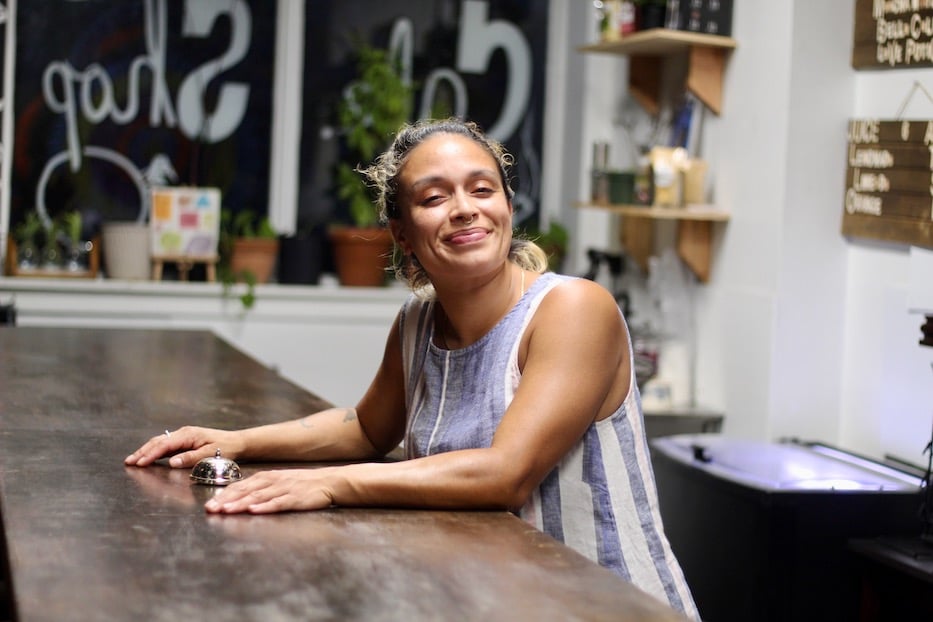
Madeline's owner Hazel Lebron.
As she began to tidy up at the bar, Madeline’s owner Hazel Lebron said that gatherings like Tuesday’s are exactly why she founded the space, a restaurant that has since become a collective, coffee shop, art gallery and small business incubator.
“It’s really nice to grow into the arts community,” she said. “It just feels right, because that’s what this space is meant for—to be a part of this.”

